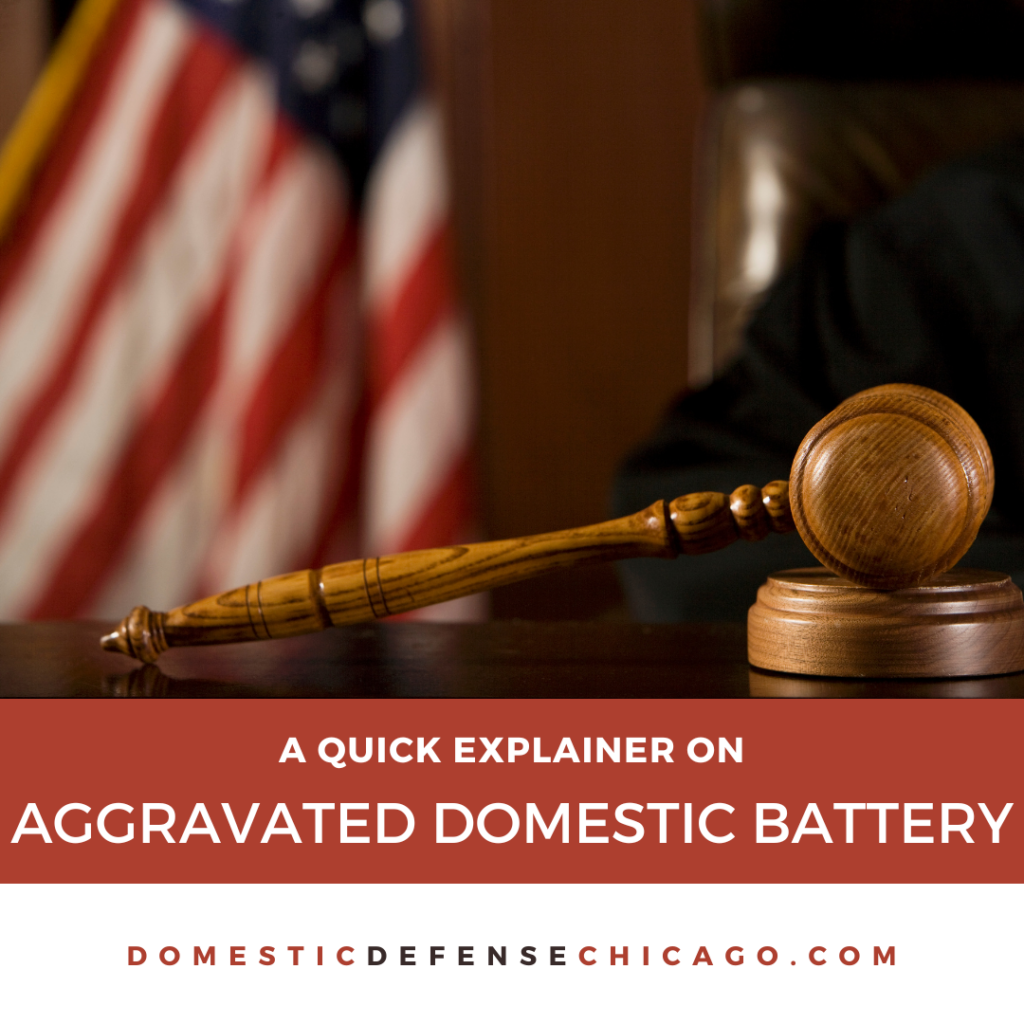In Illinois, domestic battery becomes “aggravated” under certain serious circumstances, leading to more severe charges and penalties. Understanding what constitutes aggravated domestic battery, how it differs from simple domestic battery, and the potential legal consequences can be crucial for anyone facing such charges. This guide will explain the nuances of aggravated domestic battery in Illinois and what one can expect from the legal process.
Aggravated Domestic Battery in Illinois, Explained
This guide will delve into:
- The definition of aggravated domestic battery in Illinois
- Differences between domestic battery and aggravated domestic battery
- Penalties associated with aggravated domestic battery
- The impact of an aggravated domestic battery conviction on your life
- How an attorney can assist in cases of aggravated domestic battery
Here’s a closer look at each.
The Definition of Aggravated Domestic Battery in Illinois
Aggravated domestic battery in Illinois is a severe offense that occurs when an individual knowingly causes great bodily harm, permanent disability, disfigurement, or commits an act of strangulation against a family or household member. The law recognizes this as a more serious form of domestic battery due to the gravity of the injuries caused. This charge is not limited to physical harm but also includes instances where the victim’s normal breathing or circulation of blood is obstructed by applying pressure on the throat or neck or by blocking the nose or mouth.
Differences Between Domestic Battery and Aggravated Domestic Battery
The key differences between domestic battery and aggravated domestic battery lie in the nature and consequences of the act. Domestic battery may involve any unwanted physical contact that could be harmful or offensive. In contrast, aggravated domestic battery is specifically concerned with actions that result in severe injury or involve strangulation. The law treats aggravated domestic battery with greater severity because it not only breaches the peace of the household but also poses a significant threat to the life and well-being of the victim. This distinction is crucial as it elevates the charge to a felony level, reflecting the seriousness of the offense.
Penalties Associated with Aggravated Domestic Battery
As a Class 2 felony in Illinois, aggravated domestic battery carries stringent penalties. Those convicted can face 3 to 7 years in prison, with the possibility of an extended term of up to 14 years for particularly egregious cases or if the individual has prior convictions. The law also imposes a mandatory minimum imprisonment of 60 consecutive days, which cannot be suspended or reduced by probation. Fines may also be levied, which can be substantial, reflecting the gravity of the offense. These penalties underscore the state’s commitment to addressing and curbing instances of severe domestic violence.
The Impact of an Aggravated Domestic Battery Conviction on Your Life
The repercussions of an aggravated domestic battery conviction extend far beyond the legal penalties. Such a conviction can tarnish your reputation, making it challenging to secure employment, especially in jobs that require background checks or are in sensitive areas such as education or healthcare. It can lead to the loss of gun ownership rights, which is a permanent consequence under federal law. Moreover, the social and personal stigma attached to a violent felony conviction can lead to isolation and damaged relationships. In family law, a conviction can have a profound impact on child custody and visitation rights, with courts often viewing a convicted individual as a potential threat to the child’s safety.
How an Attorney Can Assist in Cases of Aggravated Domestic Battery
In facing aggravated domestic battery charges, the role of an attorney is critical. A lawyer with experience in these cases can scrutinize the evidence for any possible defenses, such as self-defense, lack of intent, or even wrongful accusations. They can negotiate with prosecutors to potentially reduce the charges or the sentence. In some cases, they may be able to have the charges dismissed altogether. An attorney’s guidance is invaluable in navigating the legal system, protecting your rights, and aiming to secure the best possible outcome under challenging circumstances.
FAQ About Aggravated Domestic Battery in Illinois
Check out these commonly asked questions about aggravated domestic battery in Illinois. If you don’t see the answers here, please call our office and we’ll get you the information you need.
What Constitutes Strangulation Under Illinois Law?
Under Illinois law, strangulation is a specific act where someone intentionally restricts another person’s normal breathing or blood circulation. This is done by applying pressure to the throat or neck or by blocking the nose or mouth. It’s a serious offense because it can quickly become life-threatening. The law treats strangulation as a severe form of violence, particularly in the context of domestic battery, due to the intimate and betraying nature of the act when committed against a family or household member.
Can Aggravated Domestic Battery Charges Be Reduced?
Yes, there are instances where aggravated domestic battery charges can be reduced. This typically depends on various factors, including the strength of the evidence, the specifics of the incident, and the defendant’s criminal history. An attorney can negotiate with the prosecution to potentially reduce the charges to a less severe offense or to seek alternative sentencing options that may include probation, counseling, or community service in lieu of prison time.
What Are the Defenses Against Aggravated Domestic Battery Charges?
Several defenses can be employed against aggravated domestic battery charges. Self-defense is a common defense if you can show that you were protecting yourself from imminent harm. Lack of intent is another defense if you can demonstrate that any harm caused was accidental and not intentional. Additionally, disputing the severity of the injuries or the circumstances under which they occurred can also be a defense strategy. An attorney can help you understand which defense applies best to your situation and can work to build a strong case on your behalf.
Does the Victim Have to Press Charges for the State to Prosecute?
No, in Illinois, the decision to prosecute a case of aggravated domestic battery does not solely rest with the victim. Even if the victim chooses not to press charges, the state can still pursue the case. This is because the state recognizes the broader implications of domestic violence on society and the potential ongoing risk to the victim and others. Therefore, the state may proceed with prosecution in the interest of public safety and justice.
How Does an Aggravated Domestic Battery Conviction Affect Child Custody?
A conviction for aggravated domestic battery can have a significant impact on child custody decisions. The court’s primary concern is the child’s safety and well-being. If a parent is convicted of such a serious offense, the court may view them as a potential danger to the child. This can result in the loss of custody or visitation rights, or the imposition of supervised visitation. The court may require the convicted parent to complete certain programs or meet other conditions before considering any changes to custody or visitation arrangements.
Aggravated domestic battery is a grave matter in Illinois, carrying significant legal and personal consequences. If you’re facing such charges, it’s imperative to understand the legal definitions, potential penalties, and the importance of skilled legal defense.
Do You Need to Talk to an Attorney About Domestic Battery Defense?
If you need to talk to a domestic battery defense attorney in Illinois, we’re here to help. Call us at 847-920-4540 now – we’ll be happy to give you a free consultation and talk to you about your options.







Leave A Comment
You must be logged in to post a comment.